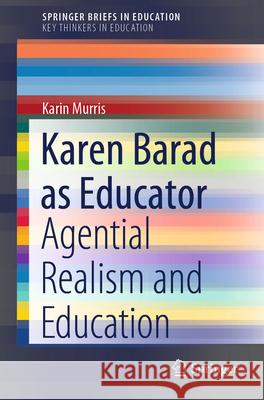Karen Barad as Educator: Agential Realism and Education » książka
topmenu
Karen Barad as Educator: Agential Realism and Education
ISBN-13: 9789811901430 / Angielski / Miękka / 2022 / 112 str.
Kategorie:
Kategorie BISAC:
Wydawca:
Springer
Język:
Angielski
ISBN-13:
9789811901430
Rok wydania:
2022
Ilość stron:
112
Waga:
0.17 kg
Wymiary:
23.39 x 15.6 x 0.58
Oprawa:
Miękka
Wolumenów:
01
Dodatkowe informacje:
Wydanie ilustrowane











